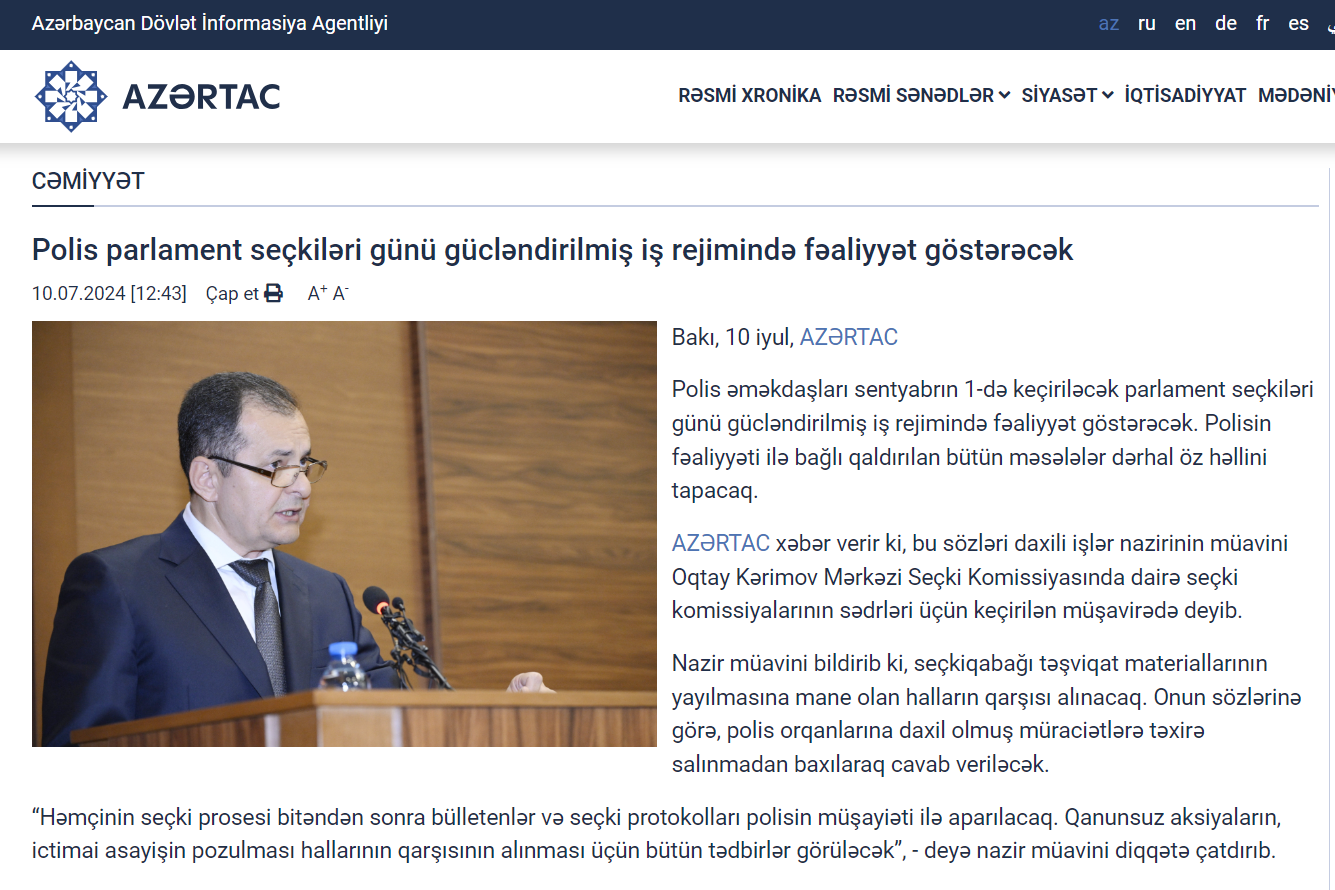‘Enhanced’ police presence announced for Azerbaijan’s parliamentary election

Azerbaijan’s Deputy Interior Minister, Ogtay Karimov, has announced that there will be a heightened level of security around the parliamentary elections in September, with increased surveillance around polling stations and police escorting ballot boxes.
Karimov made the announcement at a meeting of the Central Election Committee (CEC) on Azerbaijan’s snap parliamentary elections announced for 1 September.
‘Persons who intend to interfere with the normal conduct of elections will be promptly identified and measures will be taken against them’, he said.
Karimov said that after polls closed, polling stations would be guarded during the counting of ballots.
‘Ballots and voting protocols will be delivered to the district election commissions, and from there to the Central Election Commission, accompanied by police squads’ he said.
He also said the police would prevent protests and rallies on election day.
‘During the election campaign, necessary measures will be taken to protect public order, ensure public safety, and prevent illegal actions that are not organised according to the rules defined by the Law on Freedom of Assembly’, he said.
The reasons behind the extra security remain unclear, and mention of the deputy minister’s speech has since been removed from most state and pro-government media.
Bashir Suleymanli, an Azerbaijani human rights defender, told OC Media that he was surprised when he heard about the measures.
‘It is true that the law does not prohibit the police from escorting ballots and the protocols, but I am also interested to know what is going on’, he said, adding that this had never taken place before.
‘What could happen during the election that has made [the police] decide to accompany the ballots and protocols?’, he asked.
Natig Jafarli, who is running for parliament from the ReAl party, highlighted that the police could not legally enter polling areas, which several pro-government media had initially suggested they would.
‘The police should be in the polling area only at the request of the head of the election committee, or a request, especially in situations regarding security, after drawing up a special official protocol’, he told OC Media.
Jafarli also suggested that having police officers escort the ballots would not lead to any less tampering than was usual in Azerbaijani elections.
‘If the election documents are submitted to the Central Election Committee by other persons and not by the police, does this mean that these documents will not be tampered with? No’, he said.
Mustafa Hajibayli, the spokesperson for the opposition Musavat party, told OC Media that the protocols recording the number of votes for each candidate had ‘unfortunately’ in recent years been drawn up at district election commissions instead of individual polling stations.
‘If the result of the vote had been legally documented, it would not have mattered which vehicle was used to deliver the documents to the polling districts’, he said.
A ‘5th Column’?
News of the deputy minister’s speech announcing the extra security measures was initially disseminated widely on state and pro-government media, with some appearing to misquote the deputy minister.
Soon after, articles in APA, Azertag, and others were removed. The public broadcaster, which initially shared footage of the deputy minister’s speech, also deleted the video.

Several hours later, and after OC Media began making inquiries about the extra security, state media agency APA published a story about an apparent ‘5th Column’ that intended to disseminate news about the topic to make a ‘storm in a teacup’.
Some of the deleted articles appeared to suggest that the deputy minister’s speech had announced certain unlawful measures, including that police might be present in polling stations.
One pro-government media outlet, Yeni Musavat, misquoted Karimov as stating that ‘citizens should follow ethical rules on election day’, where he actually stated that police officers should do so. Unlike most others, the article from Yeni Musavat remains online.
The Interior Ministry’s chief spokesperson, Elshad Hajiyev, told OC Media that ‘the ministry fulfils the responsibilities established by law in the field of preventing, solving, and protecting crimes. The rule of law and protection of the rights and freedoms of every person.’
He said that high-security conditions would be created so that citizens could vote freely in the elections.
Hajiyev also denied that any special measures were being prepared for the elections, and stated that the police would not intervene in matters not within their powers.
‘The police staff are responsible only for fulfilling the requirements of the relevant provisions arising from the Electoral Code: timely provision of citizens with identification documents, [with other police staff] mobilised to fulfil the duties of [registering citizens as voters] at their place of residence.’
Jamil Hasanli, who leads the National Council of Democratic Forces, an opposition bloc that includes the Popular Front Party and others, told OC Media that the Deputy Interior Minister’s comments to the Central Election Committee made clear that the government intended to fully control the elections.
‘His presence at this meeting showed that the elections in the Azerbaijani parliament will be held under police control, and the deputy minister spoke about this even before the elections’, said Hasanli.
‘They said that the elections would be democratic and that opposition parties would take part in them, but this speech called into question everything that would be a democratic election. His speech is aimed at intimidating society: if something happens, you will see us in front of you’, said Hasanli.









